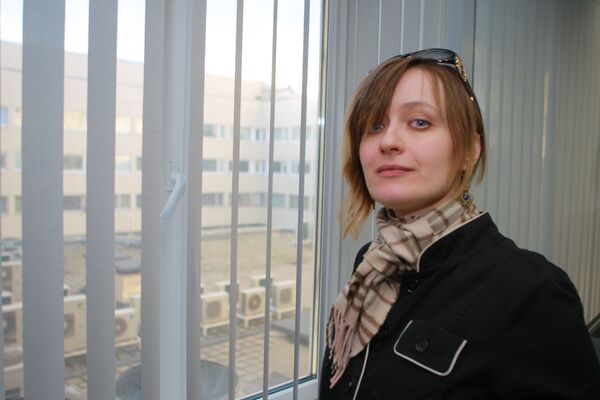The lonely death of famous actor Andrei Panin shocked Russian society, but considering how dangerous it is to be a middle-aged man in Russia, Panin’s demise is not surprising.
According to official statistics following the latest census, the average life expectancy for a Russian man is 64.3 years. Russia currently has one of the largest lifespan gender disparities in the world, with women living for 76.1 years on average.
Alcoholism is usually cited as the main reason for this disparity, and Panin, who would have turned 51 this year, was alleged to have been a heavy drinker by some of his friends, though others have vehemently denied it. The investigation into his death is still ongoing, but according to preliminary police findings published in the government daily Rossiiskaya Gazeta, the actor may have simply tripped and hit his head, suffering heavy blood loss. Police officers are also looking into the possibility that someone may have killed Panin, which is obviously a necessity at this point.
Yet what got me about this story is the fact that Panin died in the apartment he went to when he “wanted to be alone,” according to some of his friends who have been eager to talk to the media. They allege that wanting to be alone was, in the actor’s case, a euphemism for drinking. The top Google search term for Panin in Russian right now is “Panin alcoholic.”
In his death, the gifted, award-winning actor has taken on yet another role – one as the hero of a cautionary tale about the dangers of excess.
As comedian Mitch Hedberg, who himself died of drug abuse, once put it, “Alcoholism is a disease, but it’s the only one you can get yelled at for having.” Posthumously, Panin is getting yelled at – even though his relationship with alcohol is a matter of debate. On some level, Russian society is growing weary of alcoholic excess, especially among creative people. It’s cool to be an alcoholic plumber, but the tortured persona of an alcoholic artist is beginning to grate on the public.
The fact that heavy drinking on the arts scene is beginning to be frowned upon is a good thing, but in the case of Panin, I believe the focus on alcohol has obscured another important issue – depression among middle-aged Russian men.
This is the generation that has seen too much – that came of age as the Soviet Union stagnated and then died altogether. The generation that has, to a certain extent, given up on itself.
It’s not just a matter of rejecting a healthy lifestyle and looking at therapy as a trendy exercise in narcissism, but also a matter of having bitten off too much and starting to choke.
Russian women of a certain age are used to being the consummate survivors. They can’t let themselves go, because the younger generations depend on them. This is why you so often hear them say that they live for their kids and grandkids – even if severely depressed, they must soldier on. Meanwhile, social status means that medicating their depression with substance abuse and a sedentary lifestyle are largely off the table. A lifestyle of excess is considered chiefly a man’s prerogative.
Of course, following the boozy years of Boris Yeltsin, the Russian political elites, which are mostly made up of men, have been keen to reinvent themselves. This is why Vladimir Putin’s image as a hyper-masculine, confident athlete must be considered in context of his predecessor’s lifestyle.
Other politicians and diplomats have also been eager to show the world that the modern Russian man is both physically and socially active.
Yet the continuing problem of social inequality in Russia means that for ordinary Russian men, such changes at the top often mean very little. If anything, they just compound the general sense of bitterness and resignation many of these men feel.
Today, I wish Panin could have called a friend up, instead of sequestering himself in his apartment. I wish his neighbors had cared enough to call the authorities when they heard strange noises next door. I wish it had all gone down differently – for him and for thousands of people like him.
Trendwatching in Russia is an extreme sport: if you’re not dodging champagne corks at weddings, you’re busy avoiding getting trampled by spike heels on public transportation. Thankfully, due to an amazing combination of masochism and bravado, I will do it for you while you read all about it from the safety of your living room.
Natalia Antonova is the acting editor-in-chief of The Moscow News. She also works as a playwright – her work has been featured at the Lyubimovka Festival in Moscow and Gogolfest in Kiev, Ukraine. She was born in Ukraine, but spent most of her life in the United States. She graduated from Duke University, where she majored in English and Slavic Literature. Before coming to Moscow, she worked in Dubai, UAE and Amman, Jordan. Her writing has been featured in The Guardian, Foreign Policy, Russia Profile, AlterNet, et al.
Trendwatcher: In (Grudging) Praise of Moscow’s Awesomely Rude Salespeople
Trendwatcher: Rebel Dzhigurda Does the Harlem Shake in Moscow
Trendwatcher: Of Blonds, Corruption and Poetry
Trendwatcher: the Mountain of the Dead Is Still Alive
Trendwatcher: Migrants in Moscow Break Jaws and Make Peace
Trendwatcher: Meanwhile in Russia, a Tank Crossed the Road
Trendwatcher: Acid Attack on Bolshoi Director Has Terrifying Implications
Trendwatcher: Irina Kabanova – No One to Turn To?

